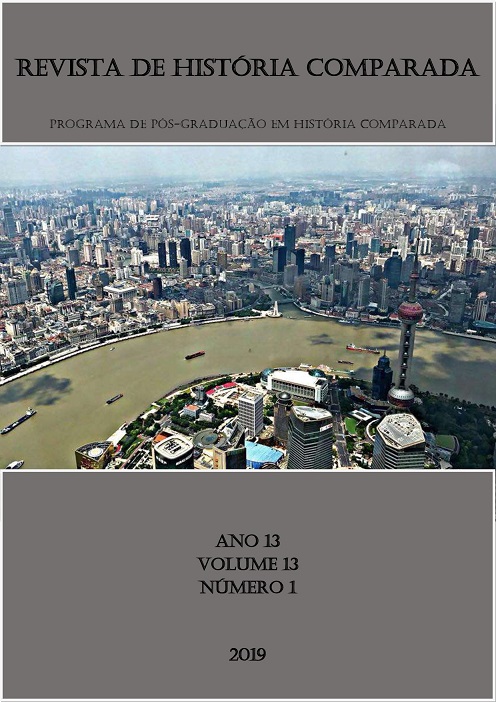THE ANALYSIS OF LARGE SOCIAL SYSTEMS IN GLOBAL HISTORY: A METHODOLOGICAL APPROACH
Resumo
This article begins from the assumption that in a rapidly globalizing world, an important frontier in the understanding of the history of human society is the recognition and definition of large social systems. We begin with an attempt to define the ‘large social system’, proceed with analyzing the best methodology for defining and measuring such a system. It is argued that large social systems often have particular economic or institutional characteristics which act as ‘sinews’ for the system. At the same time, a large social system is often to be found hiding in ‘plain sight’ as it were. This is because its scale does not easily conform to a single nation or culture—the usual units of analysis for historians of human society. Thus, simply identifying a large social system, and defining its temporal and geographical boundaries, can bring significant insights. Identifying key mechanisms which actuate the system is often integral to the definition process.
Of course, there are existing methodologies which can be of greater and lesser use for defining and explaining the workings of large social systems. We consider four of these: so-called ‘Global History’, World History, Comparative History, and New Institutionalism. The pros and cons of each of these methodologies are briefly assessed, and some new methodologies and guidelines are suggested for moving forwards with this exciting frontier in historical, economic, and social science.Downloads
Referências
ABU-LUGHOUD, Janet. Before European hegemony: the world system AD 1250-1350. Nova York: Oxford University, 1991.
ALLEN, Robert. The British industrial revolution in global perspective. Cambridge: Cambridge University, 2009.
ANTUNES, Catia, An Old Practitioner Still in Search of the métier d'historien Response to Peer Vries “The Prospects of Global History: Personal Reflections of an Old Believer”. International Review of Social History, v. 64, n. 1, p. 123-127, 2019.
ASTON, Trevor; PHILPIN, Charles. The Brenner Debate: Agrarian Class Structure and Economic Development in Pre-industrial Europe. Cambridge, Nova York, Melbourne: The University of Cambridge, 1987.
BELICH, James; DARWIN, John; FRENZ, Margret; WICKHAM, Chris (Ed.). The prospect of global history. Nova York: Oxford University, 2016.
BOTTICINI, Maristtela; ECKSTEIN, Zvi. The chosen few: How education shaped Jewish history, 70-1492. Princeton: Princeton University, 2014.
BRAUDEL, Fernand. La Méditerranée et le monde méditerranéen à l'époque de Philippe II. Paris: Librairie Armand Colin, 1949.
BRAUDEL, Fernand. The Mediterranean and the Mediterranean world in the age of Philip II (Vol. 2). Berkeley, Los Angeles, Londres: University of California, 1995.
CLARK, Peter. (Ed.). The Oxford handbook of cities in world history. Oxford: Oxford University, 2013.
COURTOIS, Hélène. Finding Our Place in the Universe: How We Discovered Laniakea – the Milky Ways Home. Cambridge: MIT, 2019.
DOSSEY, Leslie. Wife beating and manliness in late antiquity. Past and Present, v. 199, n. 1, p. 3-40, 2008.
EPSTEIN, Stephen; PRAK, Maarten (Eds.). Guilds, innovation and the European economy, 1400–1800. Nova York: Cambridge University, 2008.
FOUCAULT, Michel. Discipline and punish: the birth of the prison. New York: Pantheon, 1977.
FYNN-PAUL, Jeff. Tartars in Spain: renaissance slavery in the Catalan city of Manresa, c. 1408. Journal of Medieval History, v. 34, n. 4, p. 347-359, 2008.
FYNN-PAUL, Jeff. Empire, monotheism and slavery in the greater Mediterranean region from antiquity to the early modern era. Past and Present, v. 205, n. 1, p. 3-40, 2009.
FUKUYAMA, Francis. The end of history?. The national interest, v. 16, p. 3-18, 1989.
GEIGER, Roger. Research and relevant knowledge: American research universities since World War II. Piscataway, NJ: Transaction, 2004.
GREIF, Avner. Institutions and the path to the modern economy: Lessons from medieval trade. Nova York: Cambridge University, 2006.
HUNTINGDON, Samuel. The clash of civilizations. Foreign affairs, v. 72, n. 3, p. 22-49, 1993.
NORTH, Douglass; WEINGAST, Barry. Constitutions and commitment: the evolution of institutions governing public choice in seventeenth-century England. The Journal of Economic History, v. 49, n. 4, p. 803-832, 1989.
SCHOFER, Evan; MAYER, John. The worldwide expansion of higher education in the twentieth century. American sociological review, v. 70, n. 6, p. 898-920, 2005.
STAVASAGE, David. States of credit: Size, power, and the development of European polities. Princeton: Princeton University, 2011.
VAN SCHENDEL, Willem. ‘Geographies of knowing, geographies of ignorance: jumping scale in Southeast Asia’. Environment and Planning D: Society and Space, v. 20, n. 6, p. 647–68, 2002.
VRIES, Peer, The Prospects of Global History: Personal Reflections of an Old Believer. International Review of Social History, v. 64, n. 1, p.111-121, 2019.
WALLERSTEIN, Immanuel. The modern world-system I: Capitalist agriculture and the origins of the European world-economy in the sixteenth century (Vol. 1). Berkeley, Los Angeles, Londres: University of California, 1991.
WARD-PERKINS, Bryan. The Fall of Rome and the End of Civilization. Oxford, Nova York: Oxford University, 2006.
Downloads
Publicado
Edição
Seção
Licença
Proposta de Política para Periódicos de Acesso Livre
Autores que publicam nesta revista concordam com os seguintes termos:- Autores mantém os direitos autorais e concedem à revista o direito de primeira publicação, com o trabalho simultaneamente licenciado sob a Licença Creative Commons Attribution que permite o compartilhamento do trabalho com reconhecimento da autoria e publicação inicial nesta revista.
- Autores têm autorização para assumir contratos adicionais separadamente, para distribuição não-exclusiva da versão do trabalho publicada nesta revista (ex.: publicar em repositório institucional ou como capítulo de livro), com reconhecimento de autoria e publicação inicial nesta revista.
- Autores têm permissão e são estimulados a publicar e distribuir seu trabalho online (ex.: em repositórios institucionais ou na sua página pessoal) a qualquer ponto antes ou durante o processo editorial, já que isso pode gerar alterações produtivas, bem como aumentar o impacto e a citação do trabalho publicado (Veja O Efeito do Acesso Livre).


